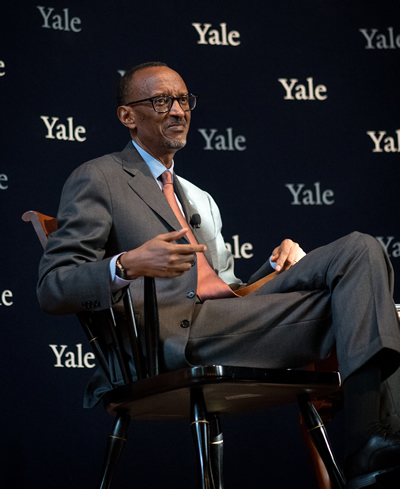“Be as humble as you are curious.”
Few statements could speak so directly to the dynamic of the room as these, when President Paul Kagame addressed the crowd in a talk last month at Yale University. The leader was invited to speak at the university to present the Coca-Cola World Fund Lecture, and the reaction to his arrival was incredibly mixed across the campus. He encouraged the audience to have an open and empathetic perspective on global affairs, one which leaves room for cultural divergence in opinion and policy. During this speech, a group of faculty and students lead a “teach-in” outside of the event, echoing critiques from Human Rights Watch, and Amnesty International about human rights concerns within the country. The commentary continued through extensive coverage in various media outlets, both positive and negative. The nation of Rwanda and Kagame’s RPF party are no stranger to controversy, with the academic and policy conversation often taking on quite the polarized tone.

In these conversations, the voice of the population is often overshadowed by powerful leaders, both from within and outside of the nation’s borders. This couldn’t be clearer than in an example provided in one of the aforementioned pieces, when writer Adam Kyamatare tells of a conversation he had with a rural Rwandan farmer. This man conveyed a sense of pride for how far Rwanda had come in peace and safety throughout his 89-years. Of course, this is only one perspective. But these voices – those of individuals living on the ground, in nations that become muddled down to mere headlines across the globe – these are the perspectives that are absolutely essential to capture. It is key to be aware that Rwanda is still in the infancy of its post-genocide reconstruction, and there are still many more questions than answers about the best way to ensure long-lasting stability in a post-violence region. But the voice of the people living there should be absolutely central in finding those difficult answers.
This dynamic comes to the forefront at an incredibly relevant moment; this difficult balance between internal and external political power is also present in a building controversy around the International Criminal Court. In recent weeks, South Africa, Burundi, and Gambia have begun processes to leave the ICC, citing a disparity in prosecutions. The balance between international legal assistance and the transmission of Western ideology has been a challenging one to establish. While almost every African being prosecuted at the ICC was brought to trial by their own governments, no charges targeting a nation outside of Africa have yet been brought forward.
Whether the case be Kagame and Rwanda, or the nations choosing to leave the ICC, the role of the international and Western communities in the affairs of many African nations is often controversial. It is tempting for outsiders to assess nations, particularly in the Global South, and declare that they know the best path for these nations to take politically, legally, and culturally. Although global dialogue can be incredibly beneficial in developing viable solutions in an increasingly globalized world, that global dialogue must also be genuinely inclusive. The farmer quoted above knows his country more intimately than a foreign scholar or policy maker ever could. In creating a safe and representative future, it’s voices like his that should play a central role in the conversation.
Brooke Chambers is a PhD candidate in the University of Minnesota’s Sociology Department. She is broadly interested in the 1994 genocide in Rwanda, bystander dynamics, and understandings of policy and transitional justice in response to genocide and mass atrocity.

Comments